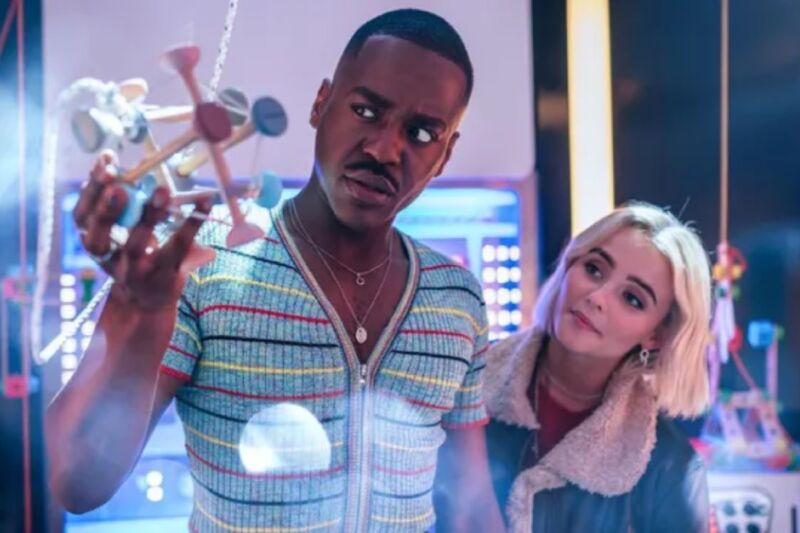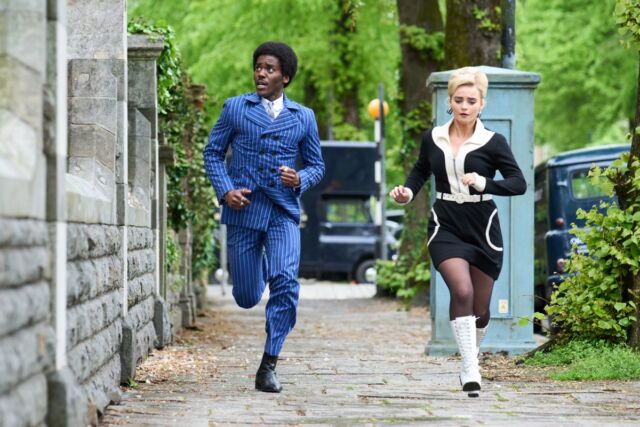
Disney+
A new season of Doctor Who is almost upon us, featuring Ncuti Gatwa’s first full run as the 15th Doctor, with a shiny new companion. It’s also the first time Doctor Who will stream on Disney+, after the platform acquired the international broadcasting rights. That could translate into a whole new generation of fans for this beloved British sci-fi series.
(Spoilers for “The Power of the Doctor,” “The Giggle,” and “The Church on Ruby Road” below.)
Here’s a brief summation for the benefit of those who may not have kept up with the more recent seasons. Russell T. Davies—who revived the series in 2005 with Christopher Eccleston as the Ninth Doctor—has returned as showrunner. Davies lost no time introducing a few new twists. When it came time for Jodie Whittaker’s Thirteenth Doctor to regenerate, fans had expected Gatwa to be introduced. Instead, the new Fourteenth Doctor was played by former Tenth Doctor David Tennant, reuniting with former companion Donna Noble (Catherine Tate) for three specials.
The third special was called “The Giggle.” During the climactic battle, the Doctor was shot. But instead of the usual regeneration, the Fourteenth Doctor “bigenerated” instead, resulting in both a Fourteenth Doctor and Gatwa’s Fifteenth Doctor, a separate physical entity. Tennant’s incarnation settled into a comfy retirement with Donna and her family, while Gatwa’s newly regenerated Doctor headed off for a fresh set of adventures. In the Christmas special, “The Church on Ruby Road,” he picked up a new companion: Ruby Sunday, played by Millie Gibson. The eight-episode new season kicks off this weekend with the Davies-penned “Space Babies” and “The Devil’s Chord.” Davies wrote six out of the eight episodes, in fact, closing out with “The Legend of Ruby Sunday” and the finale, “Empire of Death.”
Doctor Who is now in its 61st year, and this is Davies’ second stint as showrunner. Yet the new season feels as fresh and energetic as ever in terms of its storytelling. Davies attributes this to the format. “Because it is an anthology show, every week it’s a different show, a different script,” Davies told Ars. “Often it’s a different writer. He lands at a different place, a different time, a different planet. And very often he lands in a different genre. That demand means I can’t sit back. The audience wants a new punch. You want that cold open where you’re surprised and shocked and taken aback and thrilled and delighted to be going to meet The Beatles, or to find yourself under an alien dome, or to be racing through the streets of London in a thriller. All I have to do is meet the ambition of the show and keep running with it. That’s my job.”

Disney+
Furthermore, the sheer scope of the show pretty much guarantees a vast wellspring of new ideas. “You literally have the whole of time and space and within that you can tell so many different stories,” said Davies. “World War II is often a very evocative setting for Doctor Who. The Victorian era is very evocative. Somehow, it matches that wooden TARDIS in ineffable ways, so it’s been to certain locations more than once. But that’s so rich. You can think of a thousand World War II stories. You can think of a thousand Dickensian stories. And equally, Doctor Who can be completely unafraid of reinventing its own history. It’s actually seen the destruction of Atlantis three times. So, the territory always remains fertile.”
Gatwa had some very big shoes to fill when he took on this iconic character, and he pulls it off with great charisma and style. He credits the writers and production staff, as well as Gibson, with helping him craft his unique take on the Doctor. Gatwa told Ars that his greatest challenge was portraying the character’s wisdom. “I’ve always had a baby face,” he said—so much so that he was often told at drama school that he just couldn’t portray more mature characters. He found the answer in the Doctor’s regenerations. “He’s reborn each time,” said Gatwa. “He’s seeing things with new eyes, like [picking up a bowl of berries], ‘This is the best bowl of berries I’ve ever had!’ That youthful energy ended up being really helpful in terms of accessing other traits, like his wisdom.”
The elements Gatwa brings to the role also drive much of the writing, per Davies. “His skill and talent, it makes me run faster because all you ever want in life is a limitless actor and also a fearless actor,” he said. “There is nothing he can’t do. Milly, too; she has a kind of bounce and energy. It’s not just the depth of their emotions, it’s their technical comic skills. It’s my job to showcase that.” Davies also tried to make sure he challenged Gatwa and Gibson in some way on a daily basis by having them do something they’d never done before, whether it be a new stunt, an exciting confrontation with a villain, or a heartbreaking personal scene.
